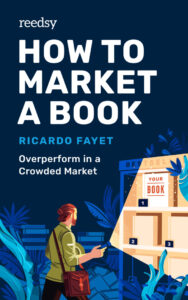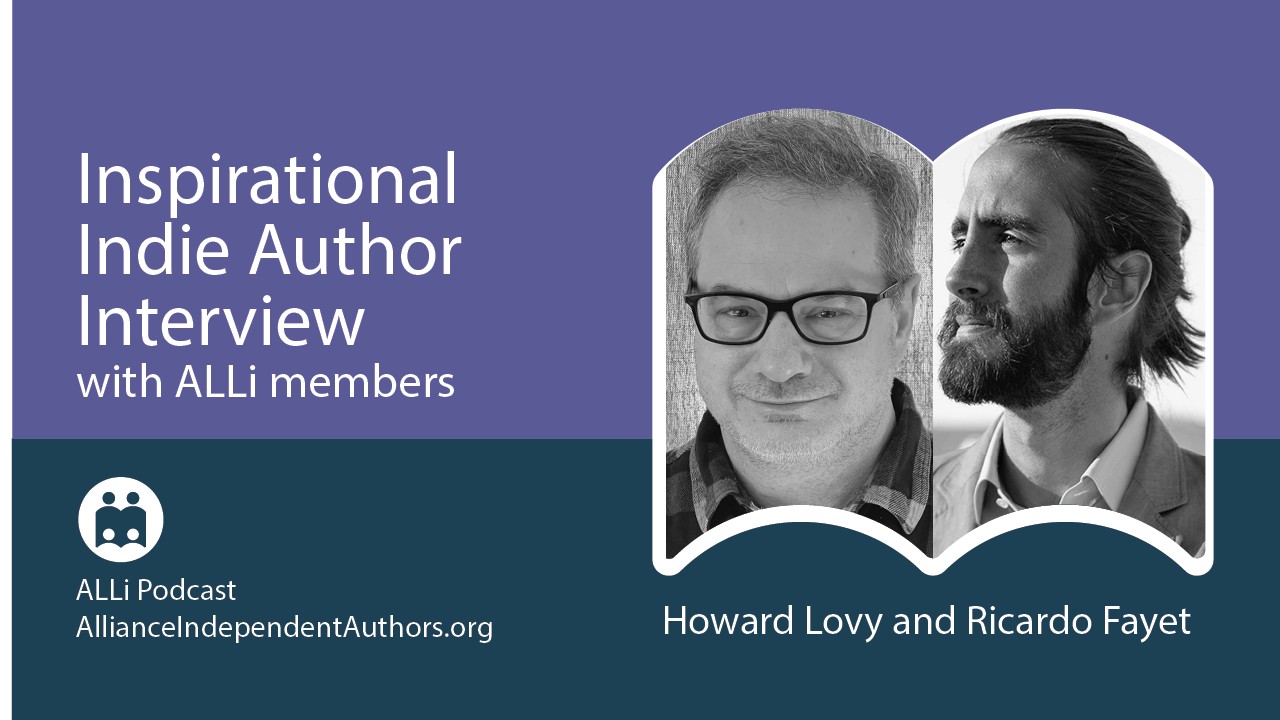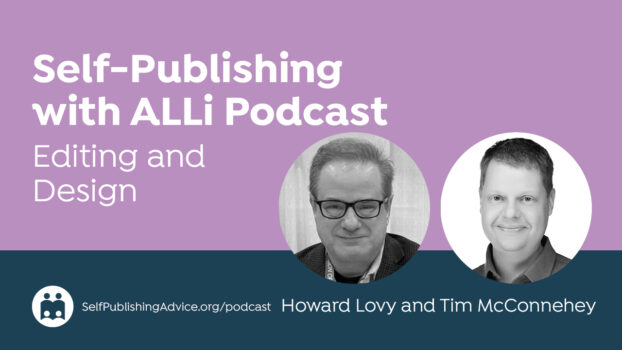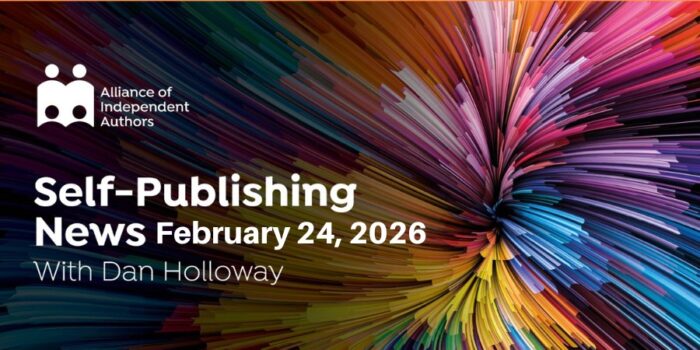My ALLi author guest this episode is Ricardo Fayet, a cofounder of Reedsy, a marketplace connecting authors to editors, cover designers, book marketers, translators, and other professionals. Also, full disclosure, I am also a developmental editor for Reedsy. As for Ricardo, when he's not coming up with new and expanded services for Reedsy, he's writing books on an important part of the publishing ecosystem: marketing.
 ALLi's Inspirational Indie Author Podcast stream is sponsored by Kobo Writing Life, a global, independent ebook and audiobook publishing platform that empowers authors with a quick and easy publishing process and unique promotional opportunities. To reach a wide readership, create your account today! Thank you, Kobo, for your support of this podcast.
ALLi's Inspirational Indie Author Podcast stream is sponsored by Kobo Writing Life, a global, independent ebook and audiobook publishing platform that empowers authors with a quick and easy publishing process and unique promotional opportunities. To reach a wide readership, create your account today! Thank you, Kobo, for your support of this podcast.
Find more author advice, tips, and tools at our Self-Publishing Author Advice Center, with a huge archive of 2,000+ blog posts, and a handy search box to find key info on the topic you need.
We invite you to join our organization and become a self-publishing ally, if you haven’t already. You can do that at allianceindependentauthors.org.
Inspirational Indie Author Interview: Ricardo Fayet
On the Inspirational Indie Authors podcast, @howard_lovy features @RicardoFayet. @ReedsyHQ cofounder helps gather an indie publishing ecosystem. Share on XDon't Miss an #AskALLi Broadcast
Subscribe to our Ask ALLi podcast on iTunes, Stitcher, Player.FM, Overcast, Pocket Casts, Spotify or via our RSS feed:
Inspirational Indie Author Interview: Ricardo Fayet. About the Author
 Ricardo Fayet is one of the four founders of Reedsy, a marketplace connecting authors to the world’s top publishing talent—from editors to cover designers, book marketers, or literary translators. He’s the author of How to Market a Book: Overperform in a Crowded Market and Amazon Ads for Authors: Unlock Your Full Advertising Potential, and a regular presenter at several prestigious writers’ conferences: NINC, 20Booksto50k, and The Self Publishing Show Live, among others.
Ricardo Fayet is one of the four founders of Reedsy, a marketplace connecting authors to the world’s top publishing talent—from editors to cover designers, book marketers, or literary translators. He’s the author of How to Market a Book: Overperform in a Crowded Market and Amazon Ads for Authors: Unlock Your Full Advertising Potential, and a regular presenter at several prestigious writers’ conferences: NINC, 20Booksto50k, and The Self Publishing Show Live, among others.
About the Host
Howard Lovy has been a journalist for more than 35 years, and now amplifies the voices of independent author-publishers and works with authors as a developmental editor. Find Howard at howardlovy.com, LinkedIn and Twitter.
If you’re a published indie author who would like to be interviewed by Howard for the Inspirational Indie Authors podcast, you need to be a member of the Alliance of Independent Authors.
Then contact Howard, including your membership number, explaining why you’re an inspirational indie author and what inspires you.
If you haven’t already, we invite you to join our organization.
Read the Transcripts — Inspirational Indie Author Interview: Ricardo Fayet
Howard Lovy: My guest this episode is Ricardo Fayette, co-founder of Reedsy, a marketplace connecting authors to editors, cover designers, book marketers, translators, and other professionals. As for Ricardo, when he's not coming up with new and expanded services for Reedsy, he's writing books on an important part of the publishing ecosystem: marketing. I'll let Ricardo Fayet tell his story.
Ricardo Fayet: Hi everyone, I'm Ricardo Fayet. I'm one of the four founders of Reedsy. If you don't know what Reedsy is, we're mostly known for our marketplace, where you can come in as an author and find editors, proofreaders, cover designers, marketers, translators, ghost-writers, pretty much anyone you'd ever need to hire throughout your writing career.
We've been going on for around nine years now. It's been a while. In the process, I've managed to write a couple of books myself, one on how to market a book and another one on Amazon ads. So, very much non-fiction in that, indie authors among, yeah, among a few other things.
I think reading has always been a part of my life. So, I grew up first in Spain and then moved to France early on. So, I spent most of my childhood in France, education as well.
Howard Lovy: For Ricardo, Reedsy was an idea he and his partners had before he even finished college.
Ricardo Fayet: Yeah, I studied mostly business management. So, I did, I think it's called a master's of science and management, or something like that, in in a university in Paris, and I actually started Reedsy before I finished the masters. So, there were a couple of years there where I had to juggle both. So yeah, that's why I always say that I don't really have much of a background prior to Reedsy, because we got into it right after university.
Howard Lovy: The idea for Reedsy came after Ricardo and his partners began reading books on their devices. They figured there must be a support system for authors in this new world. When he found out there wasn't, Ricardo and his partners created one.
Ricardo Fayet: I've always come to this more from a reader's perspective than a writing one. The genesis of Reedsy is, a friend of mine, Emmanuel, had this idea after traveling to Canada, I think, and discovering the first Kindle devices and started learning about e-reading. He basically asked himself, what impact does it have on the author side, right?
Because he was getting his first Kindle from across the pond. I was at the time reading on my on my phone when eBooks just started and we found it super convenient, but we were thinking, okay, what does this mean for authors? Does it open new doors? We started learning about self-publishing. That's how we got a little bit into the industry.
Howard Lovy: And Ricardo says, he got into the industry just at the right time.
Ricardo Fayet: It's a fascinating industry and we're very lucky to be in a creative industry. That was quite important for us, and it's what made the idea of Reedsy so appealing. First because of the industry and second, because it solved an actual problem in the industry, which was a lot of authors were starting to self-publish their work and they didn't really know where to get the professionals that they would otherwise get through traditional publishing houses.
At the same time, there were a lot of editors, designers, copy editors, proofreaders, et cetera, typesetters, who used to work within the traditional publishing houses who started going freelance, either because they were made redundant or to have more flexibility.
So, there were these two trends that we came across, and manifested the idea for Reedsy quite nicely. So, we got into it one, because we really enjoyed the industry, and second because the idea seemed like a really promising one.
Howard Lovy: And to help launch the promising idea, Ricardo turned to the indie author community.
Ricardo Fayet: No, that definitely was a building process. I think we, obviously, we weren't very well known in the industry. So even before we started Reedsy we started going to events, to the London Book Fair. I met Orna, I met Joanna Penn. I was there at the, I think it was 2014 London Book Fair, when there was this booth with a few of the American best-selling indie authors at the time. So, Hugh Howey, Bella Andre, Barbara Freethy, et cetera.
So, it was a really exciting time, and at the same time that we started learning about the industry and about self-publishing in general and the community, we also started getting known there. But I think it was hard at the beginning because, when you offer services as a company, which is essentially what we started with, editing and design, immediately a lot of people will associate you with vanity presses that have come before. The Author Solutions etc, because that's where most companies were doing services before. That's who they were.
So, we had to make it very clear that we had a completely different model, completely different philosophy, and completely different ethics, and that took a little bit of time, but I think building that reputation and maintaining that reputation for a place that really has authors best interests at heart, yeah that's been really vital in the long run.
Howard Lovy: Part of the Reedsy service involves conflict resolution and mediation if there's a problem between author and a Reedsy professional.
Ricardo Fayet: Yeah, it's hard, as you say to make both parties happy. So, we aim for reaching a fair decision. I think the idea was that we're one of the few places who really vets the professionals who we display on the marketplace. If you're an editor or designer and you apply to join Reedy, generally, you've got a 5% chance of being accepted.
We only accept people who worked on a certain number of books, ideally, who have some traditional publishing experience. If not, people who worked on books that have done well, that are well reviewed, that have sold well, et cetera. So, we're very strict in terms of the people we accept on the marketplace, and so we wanted to provide some sort of insurance.
If you are a Reedsy professional, that has to mean more than just, here's your editor and you guys work together. No, we want to provide some sort of safety net of, if something goes wrong with the collaboration, whether it's the editor's fault or the author's fault, or no one's fault, we can step in and mediate. So, that's always something that we wanted to offer.
Thankfully, we only have to do it very rarely, in around 1% of collaborations, and when it happens most of the time, I'd say it's fairly simple, one party recognizes, maybe, I don't know, if the professional has had a delay of a month in offering the deliverables, we can all agree on a small partial refund because of that.
If there's real contention, most of the time it's going to be on the quality of the work, when the author questions the quality of, I don't know, the edits, or the design work, or the marketing work that they received. Then we'll actually look at the whole collaborations, the request, the offer that was sent, the messages, and the deliverables, and evaluate whether it's up to our standards, basically.
If it's something that we cannot do ourselves, then we'll bring in a third-party person to do it. So, if the contention has to do with the quality of the edits, for example, then we'll ask a third-party editor from our marketplace to review the work, sometimes several, to give us the feedback and based on that feedback we'll reach a decision. So, that's how we do it right now. We're always trying to improve the processes, but for now it's very much case by case every time.
Howard Lovy: Of course, once your book is out there, the biggest challenge is bringing it to your audience. So, one service that reads the offers is becoming more and more popular: marketing.
Ricardo Fayet: Yeah, we started with editing and design, and then we added publicity that we still have in the marketplace. Then we added marketing, and I think that there's a lot more marketing requests and collaborations happening now than publicity. Publicity is like very niche, and it only makes sense for a very small subset of authors.
Marketing, however, has become very popular on the marketplace. We don't have a ton of marketers, because there just aren't that many great marketers out there who are still open to working with authors one-on-one. Most of the really good marketers are going to launch their courses, or they're going to try to find some scalable ways to offer their services to authors whereas Reedsy is very much one-on-one work. But we have a few on there.
We added literary translators a couple years ago, and that's taken off quite well as well. I know ALLi's been insisting a lot on European markets and how they've been growing, especially since the pandemic. We've seen a lot of translations on our marketplace into German, French, into Italian, into Spanish. So, that's been really good to see.
We've got ghost-writing as well. That's a separate beast because there the clients aren't necessarily always authors, they're more, sometimes, celebrities or people who have this story that they don't want to write themselves.
We aim to be opening to narrators in the near future as well. So, if you're a narrator and you're listening to this, feel free to reach out to us and we'll add you to our list.
Howard Lovy: Inspired by Reedsy authors, Ricardo became an author himself, focusing on marketing.
Ricardo Fayet: I think since the very beginning, working with authors was very inspiring, and you always toy with the idea of writing a book yourself one day. I was mostly thinking about fiction, because that's all I read almost. But as the years went by and I kept going to conferences and authors asked me, so what do you write, and I said, nothing; I was getting tired of that nothing answer.
So, I thought I should really write a book. We have a lot of resources around marketing, but marketing is a very complex topic, and we're basically telling authors, here are some blog posts or hire a professional, and not everyone has the funds to be able to hire a professional to do a full marketing plan for their release.
So, I thought, okay, we can create one free book where we put all our marketing knowledge in there, and so I set out to write that, and I never wrote anything because I kept procrastinating it.
So, I started a weekly newsletter instead, like a free weekly newsletter with marketing tips, and what that allowed me basically is to write this book one chapter a week while sending those newsletters.
So, every newsletter was on a specific topic, and then I had probably 80-90 newsletters that I had to rearrange, and in most cases completely rewrite to finally put this book together, but it allowed me to not have to start from scratch, which was really helpful for that first book, I think.
Howard Lovy: There are so many marketing methods available, but Ricardo recommends finding just two that work for you.
Ricardo Fayet: Finding those strategies that work for you is relatively simple. It's through testing. So, you have to test in a very systematic way. You test one or two strategies at a time, but you really put the time and the energy into testing them correctly.
What I see a lot of authors do is spend a week on Facebook ads without taking any prior course or anything else, just going to the Facebook ads interface or they boost a post, give it a week, it doesn't work, and then they conclude that Facebook ads don't work for their books, and that's their conclusion forever.
The method they follow of testing one channel is correct, but the way of testing it is completely wrong, because you've got to really put the time and the energy to properly test that Facebook advertising channel, take a free course about it or read a book, give it a proper month, logging in every day, tweaking your ads, et cetera.
After that, you can actually take a conclusion on whether they're helping your books or not. So, that's for the testing part.
But then the first half of the book focuses on the essentials that you need to have before you test any channel, because a lot of times we think of marketing as, how do I drive eyeballs to my book, and whenever Authors ask me about that, I look at their book pages and they're generally not ready to get eyeballs sent to their pages.
90% of marketing work, in my opinion, should go into coming up with a perfect cover, the perfect blurb, securing those reviews, and getting those retailer pages as neat as possible with all the correct metadata underneath.
If you really do that, then everything else becomes so much easier that you really won't have to struggle that much to bring eyeballs to it.
Howard Lovy: And Reedsy is expanding, focusing on teaching authors how to write a novel.
Ricardo Fayet: I think over the summer, we're launching a novel writing course, a paid one, called How to Write a Novel.
Not a very imaginative title, but it tells the story. Taught by Tom Bromley who's an author, editor, a ghost-writer, who's taught a number of courses at Faber and other places before in the UK, and we've spent a lot of time and energy on producing that course. So, we're really excited to launch it over the summer, and I think a lot of the authors who come to Reedsy, who come to our blog, who view our webinars, who take our free courses, they haven't written a book yet. There's a lot of people who are still at that aspiration stage, and so the idea of the course is to help them write a novel in three months, that's the whole purpose of the course.
After that, it's people who can then use Reedsy to find an editor or a designer, or publish a book, but it's adding another offering in there that I think will have a lot of synergies with the marketplace, with the writing tool, and with everything else in the Reedsy ecosystem.
Howard Lovy: Ricardo also recommends authors use a free writing tool from Reedsy.
Ricardo Fayet: Another area we're focusing on a lot is our writing tools. So, a lot of people are not aware in the first place that we have a free writing tool called the Reedsy Book Editor with recently added plotting resources to it, outlining resources, where you can create notes, different characters, locations, settings, things like that, and you can write your whole book in there. It's absolutely free. You can set goals. Say, okay, I want to write 10,000 words by the end of the week, and it's going to tell you how many words you need to write every day, send you a little notification.
So, if you don't hit your goals, et cetera, that's got a little bit of gamification in there to keep you accountable, and then once you finish a book, you can export it for free to a print-ready PDF or to an EPUB that you can then go on and publish on any distributor.
So, if you haven't invested in Vellum or Atticus yet for the formatting, you should definitely check it out. Or if you're just looking for a new distraction-free writing tool that's free, check it out as well and see if it's for you.
Howard Lovy: As for the future, well, everybody is talking about the role AI will soon play in the writing, editing, and publishing process. For now, Ricardo says, he's not worried about the competition.
Ricardo Fayet: No, it definitely is something that we're taking into account, and I think everyone should take it into account and see how it could affect their future.
Right now, I think we're still a fair way away from where AI could ever replace an editor, especially on the developmental editing side of things.
There's software that have been using AI for several years now to try to come up with some automated tools to do some of the developmental editing. May that change in the future? Absolutely, but I still think that those tools may end up being used more by the editors than the authors themselves.
Just like Photoshop is still used by colour designers rather than authors themselves, and the same thing goes for design. I see a lot of people thinking, I can just use AI now to generate my covers, but actually most of the design work on the cover, maybe not most but a good 50% of it, is in the typography and the placement of the type, and the incorporation of image and type together, and one very simple way you can tell a professional cover from a less than professional one, is just by the type, how it's placed. Some covers have amazing illustrations, but just very terrible type on them.
So yeah, you can use AI for a lot of things, and I think it provides new opportunities, maybe for authors who are on a budget to get their books out there, in at least a better shape than they would have been able to otherwise. But I think we're still very far from it being able to rival professionals, or the level of professionals that you find on Reedsy in the fields of editing, design, translation, marketing, et cetera.





